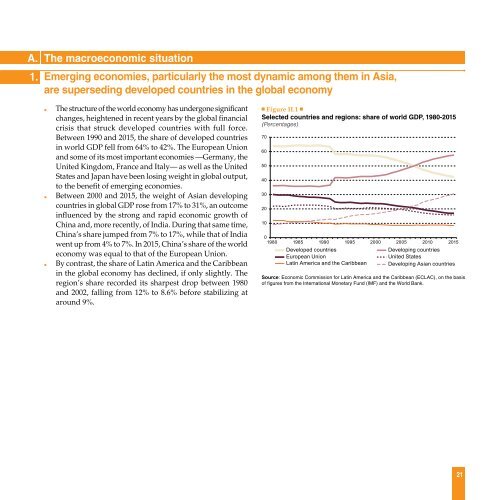La Unión Europea y América Latina y el Caribe ante la Agenda 2030 para el Desarrollo Sostenible: el gran impulso ambiental
Desde todas las regiones del planeta se observa con preocupación el aumento de la desigualdad global y la agudización de la crisis ambiental, especialmente en el caso del cambio climático. Frente a la complejidad de la situación, la comunidad internacional se ha movilizado a través de un extenso debate multilateral para ofrecer una respuesta amplia y ambiciosa. En los últimos meses se han puesto en marcha una serie de acciones colectivas que apuntan hacia un nuevo paradigma de desarrollo más sostenible e igualitario. En septiembre de 2015, la Asamblea General de las Naciones Unidas aprobó la Agenda 2030 para el Desarrollo Sostenible y los 17 Objetivos de Desarrollo Sostenible (ODS), con el reconocimiento de que el cambio climático y el desarrollo son inseparables. En esta línea, en diciembre de 2015 se aprobó el Acuerdo de París, en el que tanto naciones industrializadas como países en desarrollo se comprometen a gestionar la transición hacia una economía baja en carbono.
Desde todas las regiones del planeta se observa con preocupación el aumento de la desigualdad global y la agudización de la crisis ambiental, especialmente en el caso del cambio climático.
Frente a la complejidad de la situación, la comunidad internacional se ha movilizado a través de un extenso debate multilateral para ofrecer una respuesta amplia y ambiciosa. En los últimos meses se han puesto en marcha una serie de acciones colectivas que apuntan hacia un nuevo paradigma de desarrollo más sostenible e igualitario. En septiembre de 2015, la Asamblea General de las Naciones Unidas aprobó la Agenda 2030 para el Desarrollo Sostenible y los 17 Objetivos de Desarrollo Sostenible (ODS), con el reconocimiento de que el cambio climático y el desarrollo son inseparables. En esta línea, en diciembre de 2015 se aprobó el Acuerdo de París, en el que tanto naciones industrializadas como países en desarrollo se comprometen a gestionar la transición hacia una economía baja en carbono.
You also want an ePaper? Increase the reach of your titles
YUMPU automatically turns print PDFs into web optimized ePapers that Google loves.
A. The macroeconomic situation<br />
1. Emerging economies, particu<strong>la</strong>rly the most dynamic among them in Asia,<br />
are superseding dev<strong>el</strong>oped countries in the global economy<br />
■■<br />
■■<br />
■■<br />
The structure of the world economy has undergone significant<br />
changes, heightened in recent years by the global financial<br />
crisis that struck dev<strong>el</strong>oped countries with full force.<br />
Between 1990 and 2015, the share of dev<strong>el</strong>oped countries<br />
in world GDP f<strong>el</strong>l from 64% to 42%. The <strong>Europea</strong>n Union<br />
and some of its most important economies —Germany, the<br />
United Kingdom, France and Italy— as w<strong>el</strong>l as the United<br />
States and Japan have been losing weight in global output,<br />
to the benefit of emerging economies.<br />
Between 2000 and 2015, the weight of Asian dev<strong>el</strong>oping<br />
countries in global GDP rose from 17% to 31%, an outcome<br />
influenced by the strong and rapid economic growth of<br />
China and, more recently, of India. During that same time,<br />
China’s share jumped from 7% to 17%, while that of India<br />
went up from 4% to 7%. In 2015, China’s share of the world<br />
economy was equal to that of the <strong>Europea</strong>n Union.<br />
By contrast, the share of <strong>La</strong>tin America and the Caribbean<br />
in the global economy has declined, if only slightly. The<br />
region’s share recorded its sharpest drop between 1980<br />
and 2002, falling from 12% to 8.6% before stabilizing at<br />
around 9%.<br />
Figure II.1<br />
S<strong>el</strong>ected countries and regions: share of world GDP, 1980-2015<br />
(Percentages)<br />
70<br />
60<br />
50<br />
40<br />
30<br />
20<br />
10<br />
0<br />
1980 1985 1990 1995 2000 2005 2010 2015<br />
Dev<strong>el</strong>oped countries<br />
Dev<strong>el</strong>oping countries<br />
<strong>Europea</strong>n Union<br />
United States<br />
<strong>La</strong>tin America and the Caribbean Dev<strong>el</strong>oping Asian countries<br />
Source: Economic Commission for <strong>La</strong>tin America and the Caribbean (ECLAC), on the basis<br />
of figures from the International Monetary Fund (IMF) and the World Bank.<br />
21


















